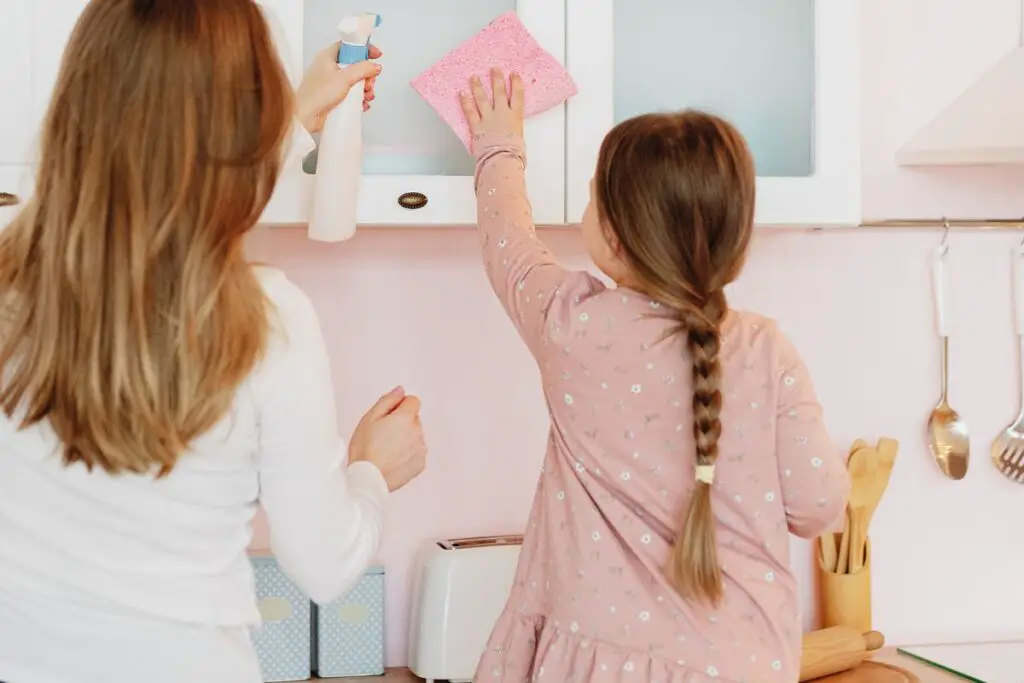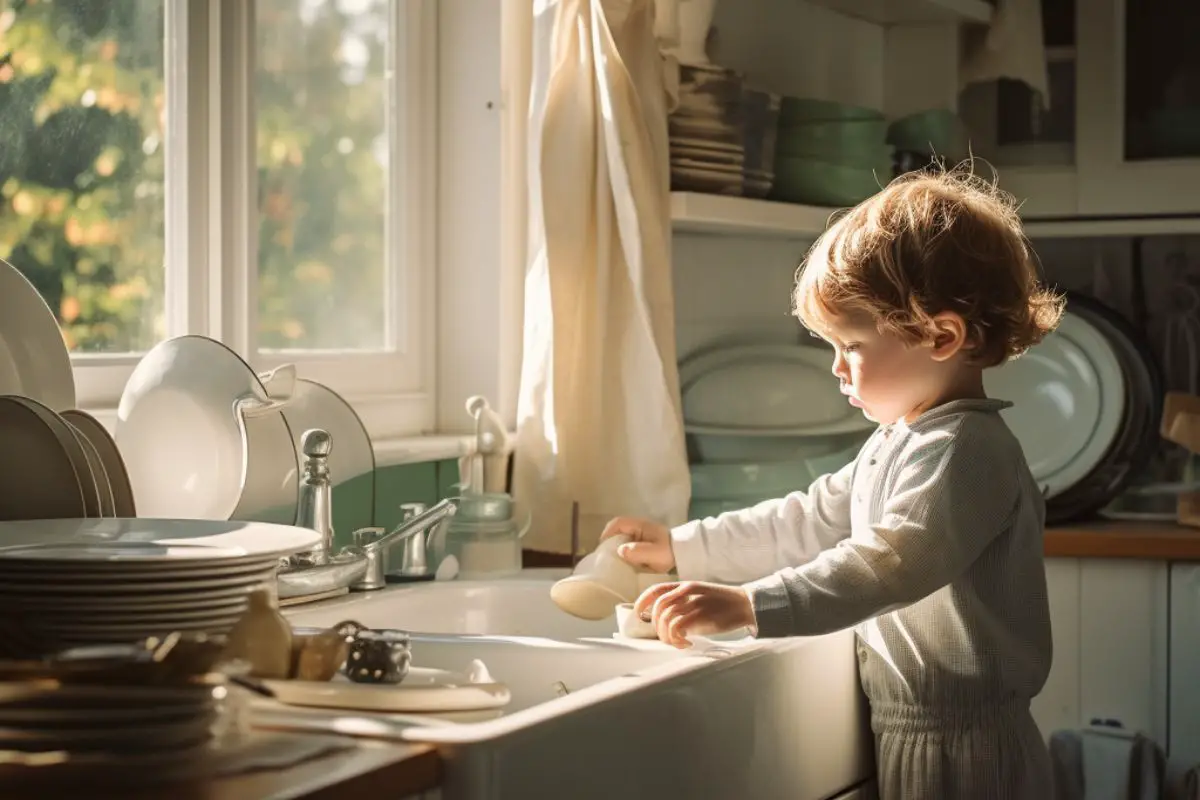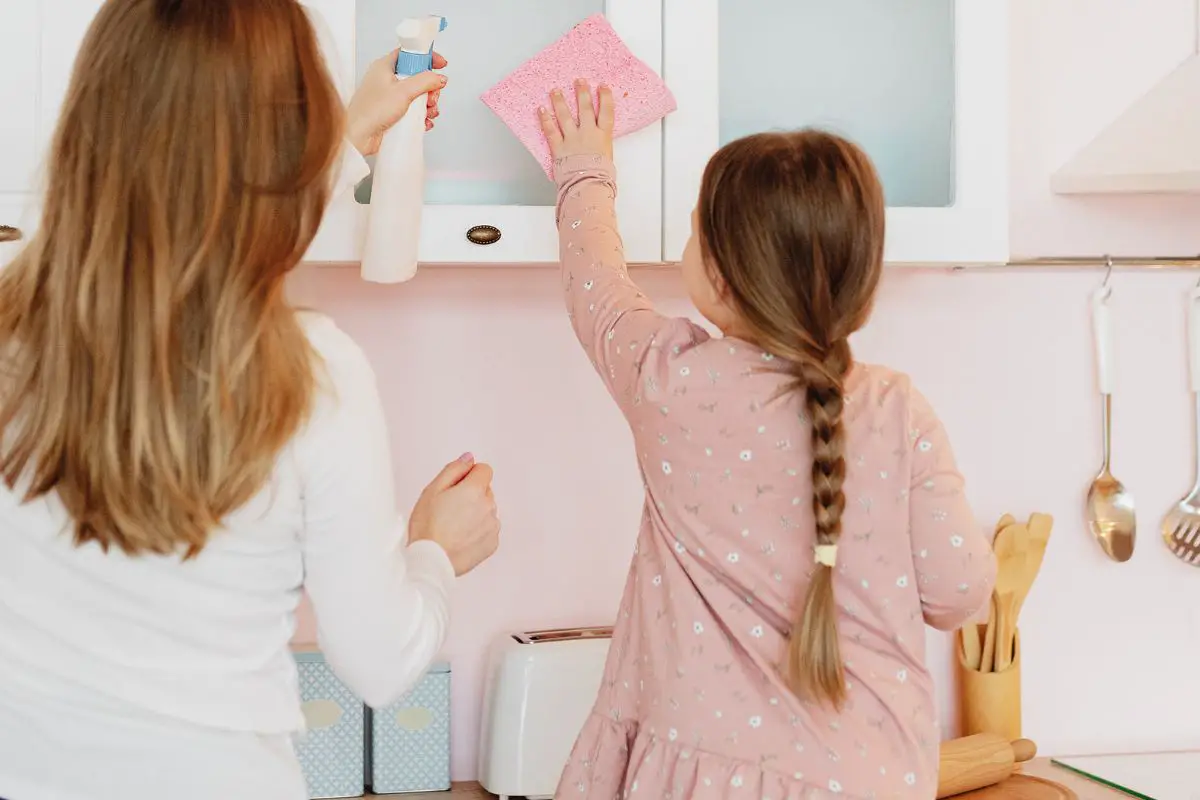Do you have a little helper eager to participate in the household chores? Here’s a guide for all parents ready to embrace their child’s enthusiasm and channel it into age-appropriate tasks.

Why chores are important for children:
I know, I know, it feels quicker and easier just to do everything yourself.
But teaching your children to do chores holds significant long-term benefits for their development. Here are several reasons why:
- Development of Life Skills: Chores provide practical experiences that allow children to acquire and refine essential life skills, such as responsibility, self-reliance, and time management
- Boosts Self-Esteem: When children complete chores, it can boost their self-confidence and self-esteem. They feel competent and capable, which contributes positively to their overall sense of self-worth.
- Sense of Responsibility: Assigning regular chores fosters a sense of responsibility and accountability in children. They learn that their actions can contribute to the well-being of the household, instilling a sense of belonging and significance.
- Teaches Work Ethic: Early experience with chores can help children develop a strong work ethic, teaching them the importance of completing tasks, the value of hard work, and the satisfaction of a job well done.
- Teamwork and Cooperation: When children participate in chores, they learn about cooperation and teamwork. This can be particularly beneficial in families with multiple children, as it teaches them how to work together to achieve common goals.
- Preparation for the Future: Chores prepare children for adult life by providing them with the skills and habits they’ll need to thrive when they live independently.
They are a part of the household and should do some of the work!
Age-appropriate chores for 4-year-olds:
- Picking up toys and books: Teach them to put away their toys and books after they’re finished playing or reading.
- Feeding a pet: If you have a family pet, a four-year-old can help by providing food and water, under supervision.
- Watering plants: They can help maintain indoor or outdoor plants with a small, manageable watering can.
- Setting the table: With supervision, they can carry non-breakable items like spoons, forks, or napkins to the table.
- Dusting: Give them a small cloth or a special duster to wipe down low surfaces.
- Sorting laundry: They can help sort clothes by color or owner before washing.
- Making their bed: While it won’t be perfect, they can start learning to pull up and straighten their sheets and blankets.
- Cleaning up spills: If they spill something, they can help clean up with a towel.
- Helping with groceries: They can carry light grocery bags or help put away non-breakable items.
- Washing plastic dishes: With a little supervision, they can wash plastic dishes in a sink with lukewarm water.
- Putting dirty clothes in the laundry basket: Teach them to put their clothes in a hamper instead of leaving them on the floor.
Why you’ll love having kids who can do chores:
You will love having kids who contribute to the household for so many reasons.
First, doing chores together can be a special time for moms and kids. While your child learns how to tidy up toys or set the table, you can chat and have fun together. This way, chores become a time for making good memories.
Second, when kids help with chores, it makes the home neater and more organized. Kids start understanding that they have a part to play in keeping the house clean. This can make things less stressful at home.
Finally, for moms, one of the best parts is seeing their kids learn important skills. When kids do chores, they learn how to be responsible and do things by themselves. These are skills that will help them a lot when they grow up.

Tips for Sucess
- Start Small: Begin with simple, manageable tasks like putting toys away, helping to set the table, or feeding a pet. These tasks are easily achievable for a young child, which can make the experience more enjoyable and less overwhelming.
- Make Chores Routine: Incorporate chores into the child’s daily or weekly routine. Try adding them to things they’re already doing, such as lunch or bedtime. Consistency helps the child understand that these tasks are a regular part of life, and over time, they’ll become a habit.
- Model the Behavior: Show your child how to do the tasks before expecting them to take them on. Children learn by watching and imitating adults. By demonstrating how tasks are done, you’re teaching them the correct and safe way to complete each chore.
- Use Positive Reinforcement: Always praise your child for the effort they put into doing their chores, not just the result. This will make them feel appreciated and encouraged to continue participating in household tasks.
- Make it Fun: Try to make chores enjoyable by turning them into a game or pairing them with fun activities. For instance, you could play some music while doing laundry or see who can pick up the most toys in a minute. This can help keep your child motivated and interested.
- Be Patient: Remember, the goal isn’t perfection. It’s normal for children to make mistakes when they’re learning something new. Offer guidance when needed, and allow them to grow and improve at their own pace.
- Gradually Increase Responsibility: As your child grows and their skills develop, gradually introduce more complex chores. This can help them continue to learn new skills and keep them engaged and challenged.
Got a small one eager to help out with the dishes or desperate to feed the family pet? Go ahead and encourage that enthusiasm! Remember, it’s all about starting small, keeping things fun, and showering them with praise for their efforts. Trust me, they’ll love the feeling of being a big kid doing important tasks.

